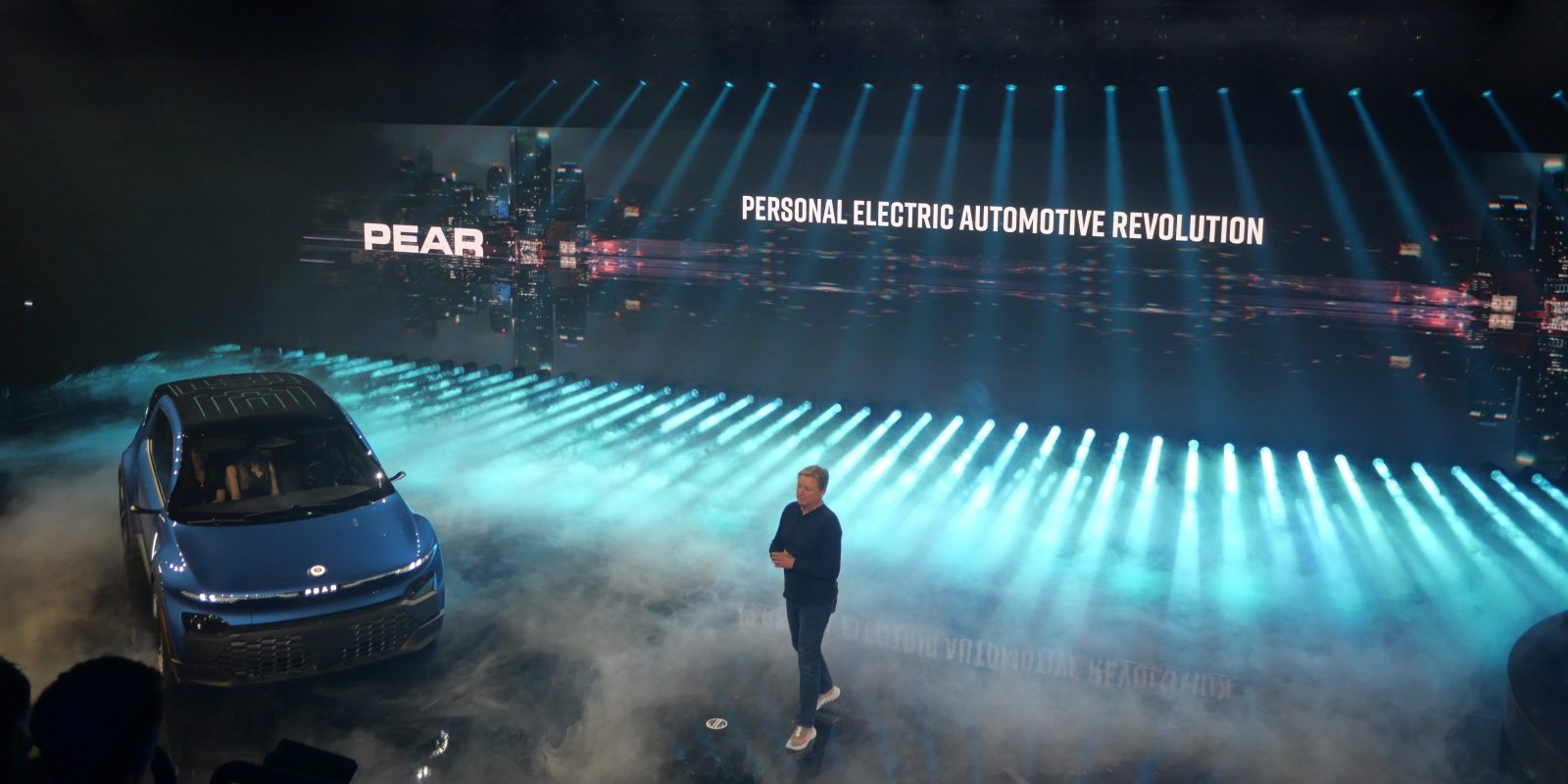
Fisker has been teasing us about its upcoming PEAR SUV for over a year now, and we finally got a chance to see the upcoming small SUV in the flesh today.
Fisker held its “Product Vision Day” today in Huntington Beach, California, and showed us prototypes of some upcoming vehicles, and we got to see the PEAR in the flesh for the first time.
The PEAR is Fisker’s second SUV, a little smaller than the Ocean, but intended to have a much lower base price – $29,900, before tax credits. This means $22,400 after tax credits, which is about as low a price anyone can ask for from a small SUV these days.
And Fisker does plan to produce the vehicle in the USA, at the old Lordstown plant, which will enable it to qualify for tax credits from the Inflation Reduction Act.
To enable this low price, Fisker says that the PEAR will have 35% fewer parts than the Ocean, making for simpler production and therefore lower costs. It’s calling the platform “SLV1,” which stands for “Simple, Light, Volume.”
As one example, Fisker CEO Henrik Fisker stated that all four seats will use the same armrest design, so instead of making four different parts, Fisker only needs to make one.
The PEAR will be made of steel, which is cheaper (but heavier) than aluminum, and Fisker would like to eventually hit 1 million vehicles annually – but that aspiration is obviously way off in the future.
Fisker still says that every vehicle it makes must have at least a few unique features, and one of PEAR’s highlights is its unique “Houdini door.”
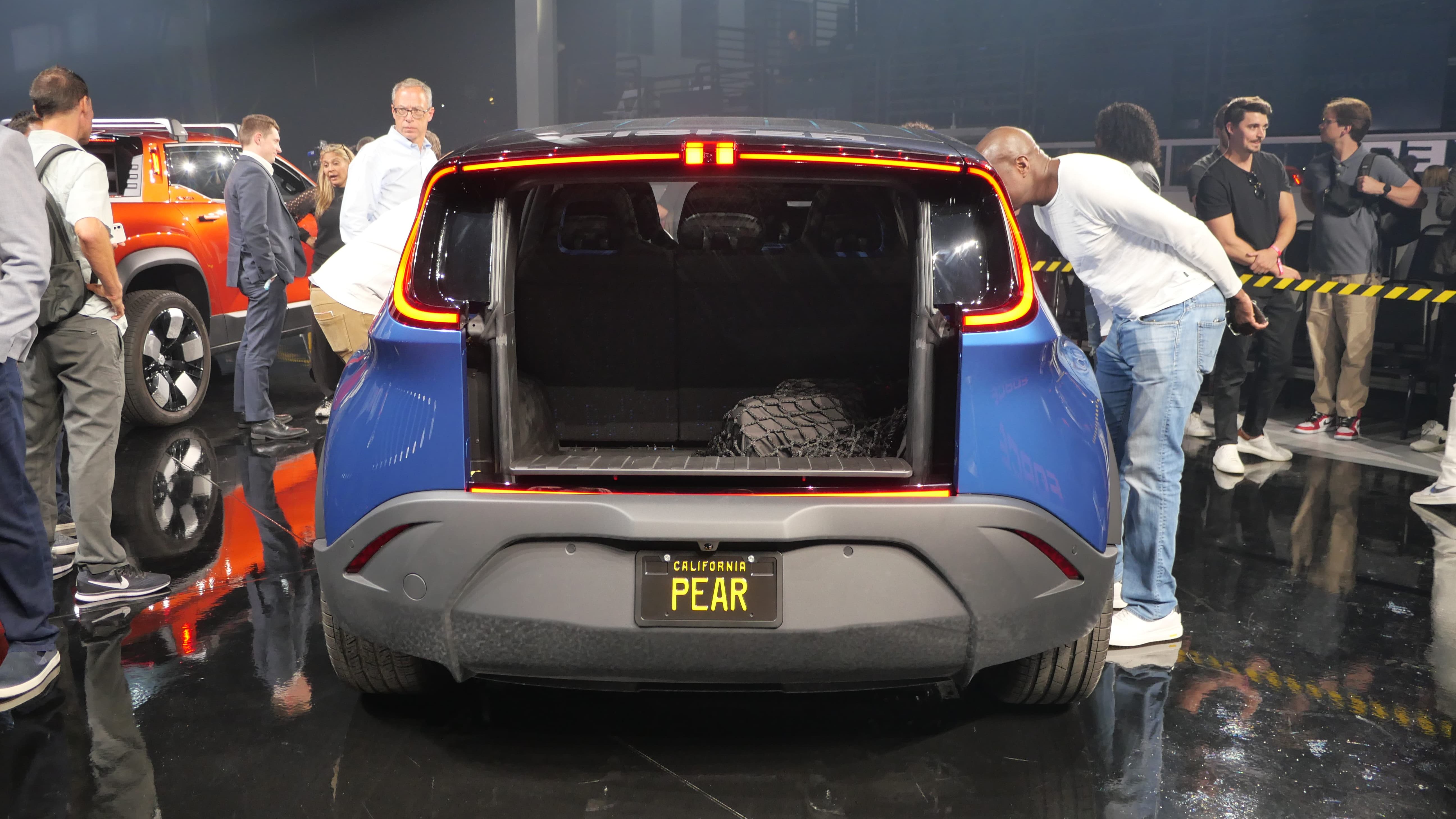
This is the company’s name for its rear hatch, which vanishes into the car body, leaving a big opening that won’t swing out and hit anything or cause you to bonk your head on it. You can see it in action in this portion of Fisker’s video (timestamped at 1:03:20).
In addition to rear storage, the PEAR will have a front drawer-like storage area, which Fisker is trying to call a “froot,” a portmanteau of front + boot, and which everyone else is just going to call a frunk anyway. You’re too late on that one, Fisker.
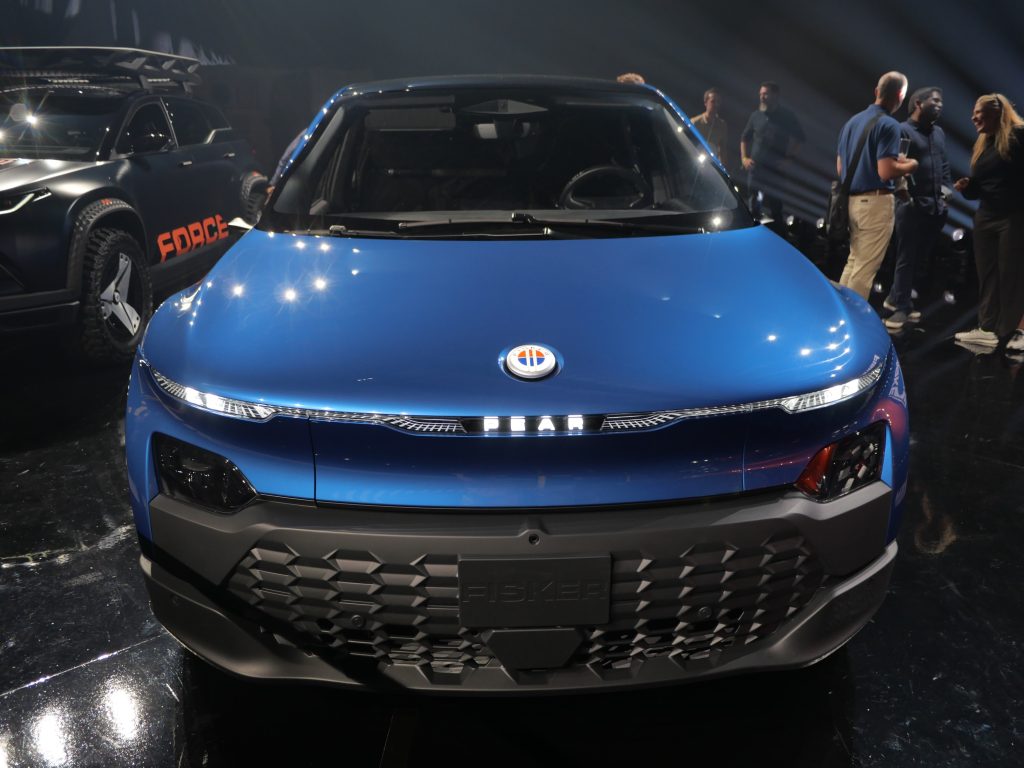
But it is different than a lot of frunks we’ve seen – instead of being under the hood, it slides out from behind the front grille area, potentially providing a flatter space than most frunks do. Fisker said that it was insulated, and thus could be used for transporting hot or cold items – though we didn’t hear whether it has its own HVAC. We didn’t get to see it in action, but you can see a glimpse of it in this part of Fisker’s video (timestamp 1:01:03).
The interior of the PEAR we saw today is nothing like initial interior images, with a much more spartan feel to it. Of course, this is still a prototype (which, as we overheard at the event, was finished this morning), so nothing is final, but we would imagine that a spartan interior might be necessary to get a price under $30K.
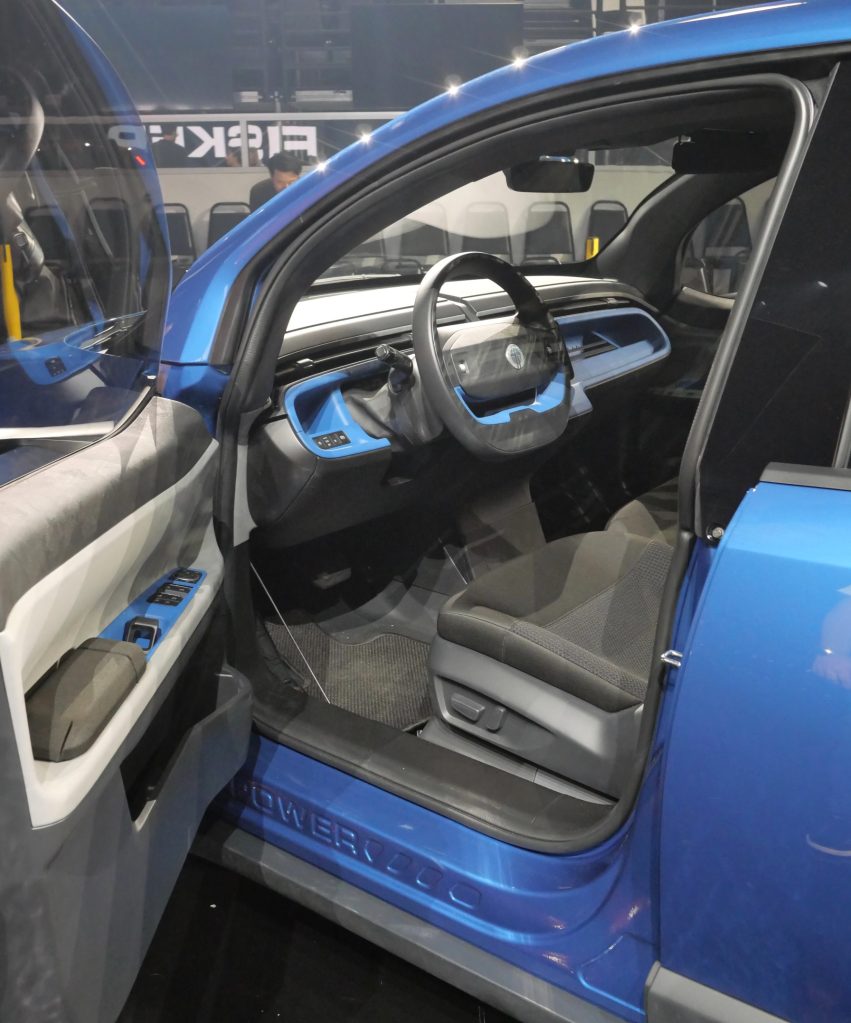
And frankly, from what we saw, it looked pretty cool. It gave off Honda Element vibes, a vehicle that was famous for having a simple and usable interior that you didn’t mind getting a little dirty, a feature that owners really liked. More focused on utilitarianism than cushiness.
But Fisker also wanted to highlight just how much interior space the PEAR has. It will have both five- and six-seat options, with the six-seat option coming with a bench seat in the front. To demonstrate the PEAR’s capacity, Fisker had six employees pile out of the car at the beginning of the presentation:
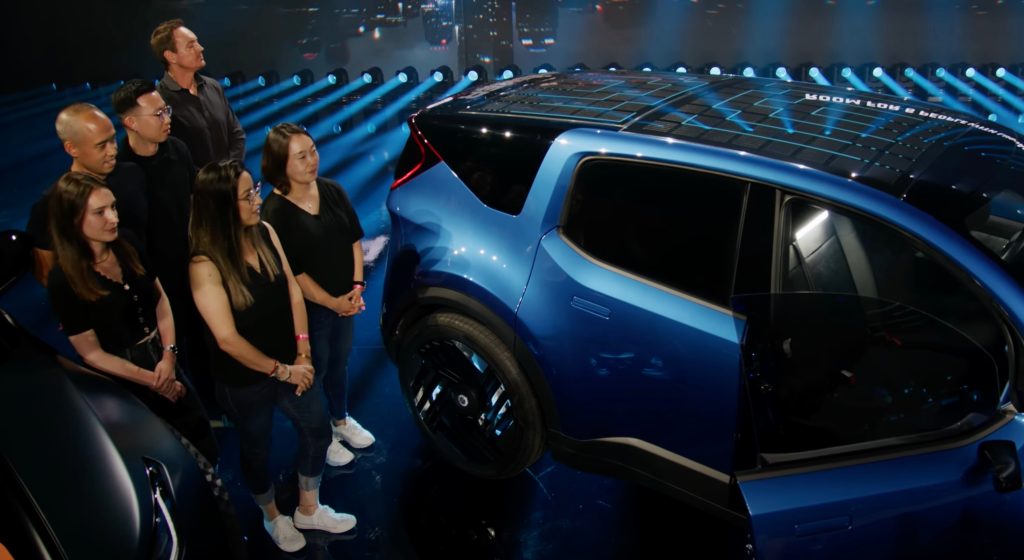
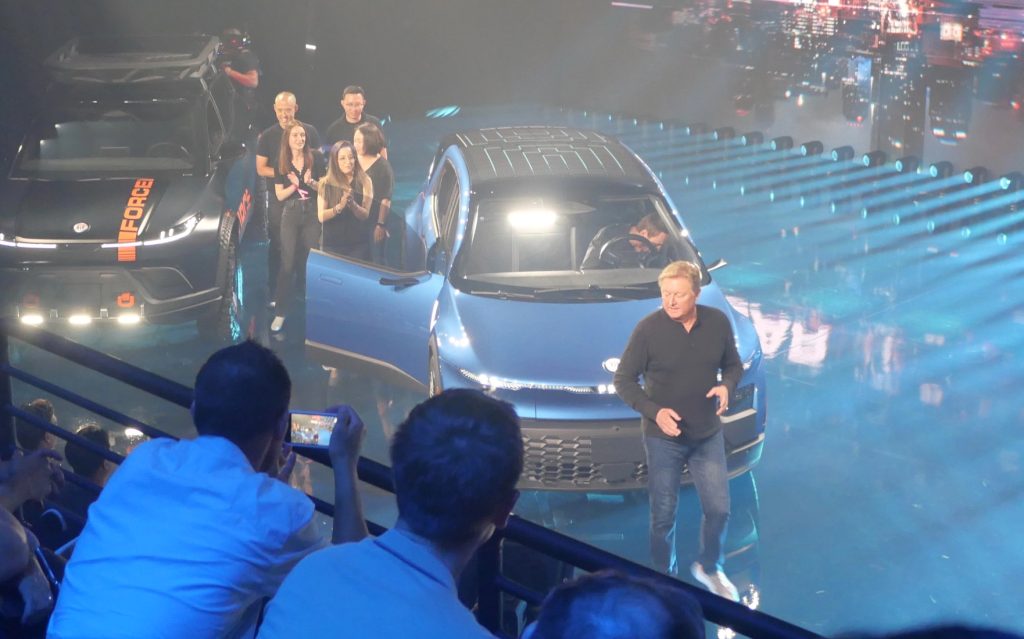
Fisker pointed out that you shouldn’t need a huge, three-row SUV to transfer six people around, including all the concomitant environmental impacts thereof (a message with which we wholeheartedly agree).
The PEAR will have a feature Fisker calls “Lounge mode,” which will reconfigure the seats (including the front seats) to create a flat space within the car for lounging around, and which will be large enough to lay down in. Should be great for car camping.
And all of this is supposedly coming in 2025. Between this car, the Alaska, and the Ronin, Fisker will go from having one car that just started shipping in 2023, to four cars in just two years time. Quite a big ask, particularly from a company with 1,000 employees, so we wouldn’t be surprised if we see some delays.
But if you want to get in line for whichever year the PEAR comes, reservations are open now on Fisker’s website, at $250 a pop.
Electrek’s Take
As we stated in the Take for the Fisker Alaska, these promises all seem great, but we must consider that they might seem too great.
We’d love a small basic utilitarian EV at a reasonable price made in volume, and the sooner it comes out the better. But the combination of making this car, at this price, and this soon, from a small company, that is not just focusing on one new vehicle program but three new vehicle programs, and trying to scale a current vehicle program… well, that’s a lot to bite off.
But as for the PEAR itself, in a year where everyone seems to be announcing gigantic land yachts, we’re happy to see a small, practical, well-priced electric vehicle in the mix. Now let’s hope it makes it to production with most of these promises intact (or at least some? please?)
FTC: We use income earning auto affiliate links. More.
